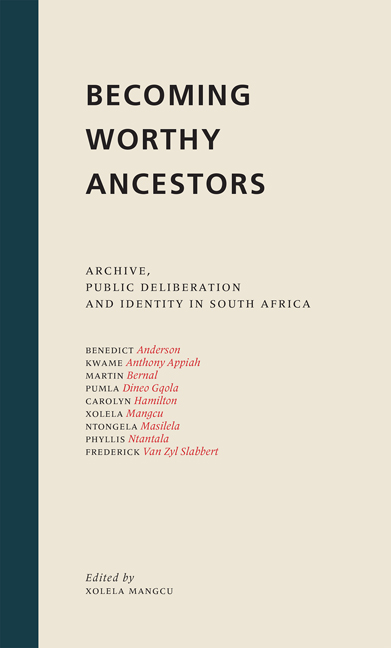Book contents
- Frontmatter
- Contents
- Preface
- Chapter One Evidentiary Genocide: Intersections of Race, Power and the Archive
- Chapter Two The Transmission Lines of the New African Movement
- Chapter Three Some Do Contest the Assertion That I Am An African
- Chapter Four Africa in Europe, Egypt in Greece
- Chapter Five Unconquered and Insubordinate: Embracing Black Feminist Intellectual Activist Legacies
- Chapter Six Identity, Politics and the Archive
- Chapter Seven The Goodness of Nations
- Chapter Eight Why Archive Matters: Archive, Public Deliberation and Citizenship
- Endnotes
- Index
Preface
Published online by Cambridge University Press: 21 March 2018
- Frontmatter
- Contents
- Preface
- Chapter One Evidentiary Genocide: Intersections of Race, Power and the Archive
- Chapter Two The Transmission Lines of the New African Movement
- Chapter Three Some Do Contest the Assertion That I Am An African
- Chapter Four Africa in Europe, Egypt in Greece
- Chapter Five Unconquered and Insubordinate: Embracing Black Feminist Intellectual Activist Legacies
- Chapter Six Identity, Politics and the Archive
- Chapter Seven The Goodness of Nations
- Chapter Eight Why Archive Matters: Archive, Public Deliberation and Citizenship
- Endnotes
- Index
Summary
In 2006 my colleague Carolyn Hamilton invited me to be a fellow in the Constitution of Public Intellectual Life Project at Wits University. The aim of the fellowship was to deepen and broaden discussions around the role of the archive in South Africa. I took up this question in relation to the making of a new South African identity asking: why does it matter that nations should care for their archives, and that they should develop a sense of shared identity? And why should these processes take place in the public domain? How could nations possibly speak about a shared sense of identity in pluralistic societies where individuals and groups also have multiple identities? And how, as Hamilton asks in her essay in this volume, can such conversations be given relevance in public discussions of reconciliation and development in South Africa?
In order to problematise these questions I thought it would be useful to invite outside scholars to join local commentators in a series of public deliberations on the contestations of archive and identity that often characterise new nations. The outside scholars I invited are regarded as leading authorities on questions of national identity and archive in the world.
In my essay, which opens the discussion in this book, I describe as evidentiary genocide the denial of the role of the Black Consciousness Movement and the Pan Africanist movement in the narrative of democracy in South Africa. In fact, denial is only part of the story. Even more dangerous has been the ‘representation’ of black consciousness as a nativist movement – quite the furthest from what it was, and from Steve Biko's description of black identity in strictly political (as opposed to biological) terms. Aimé Césaire once said that ‘blackness is historical and there is nothing biological about it.’ The exclusion and then ‘re-presentation’ of black consciousness from the public archive has had deleterious effects on our political culture, particularly in terms of how we think about identity, progress and development – a point that Carolyn Hamilton also makes in her chapter, which closes this volume.
- Type
- Chapter
- Information
- Becoming Worthy AncestorsArchive, Public Deliberation and Identity in South Africa, pp. vii - xviPublisher: Wits University PressPrint publication year: 2011



